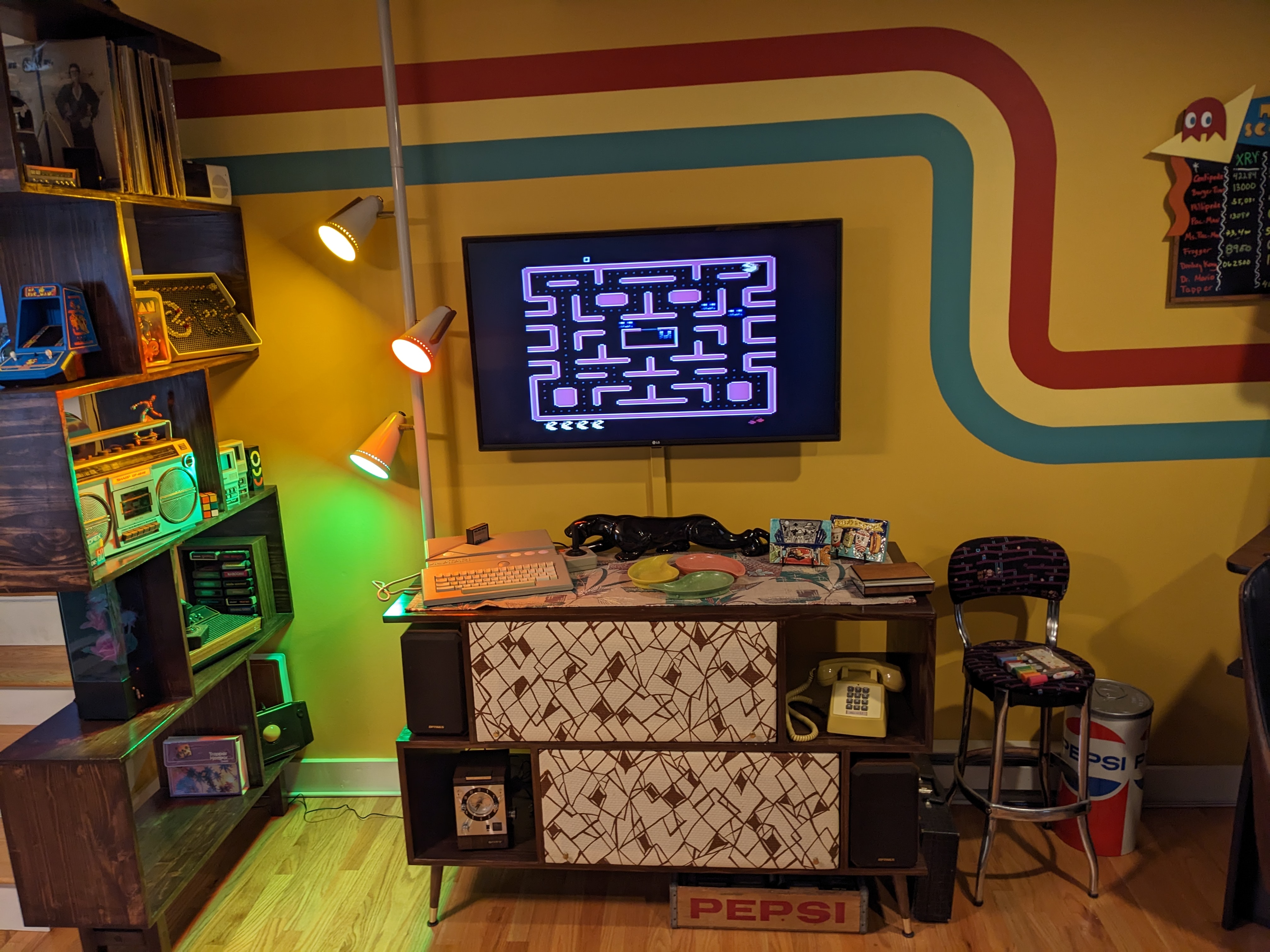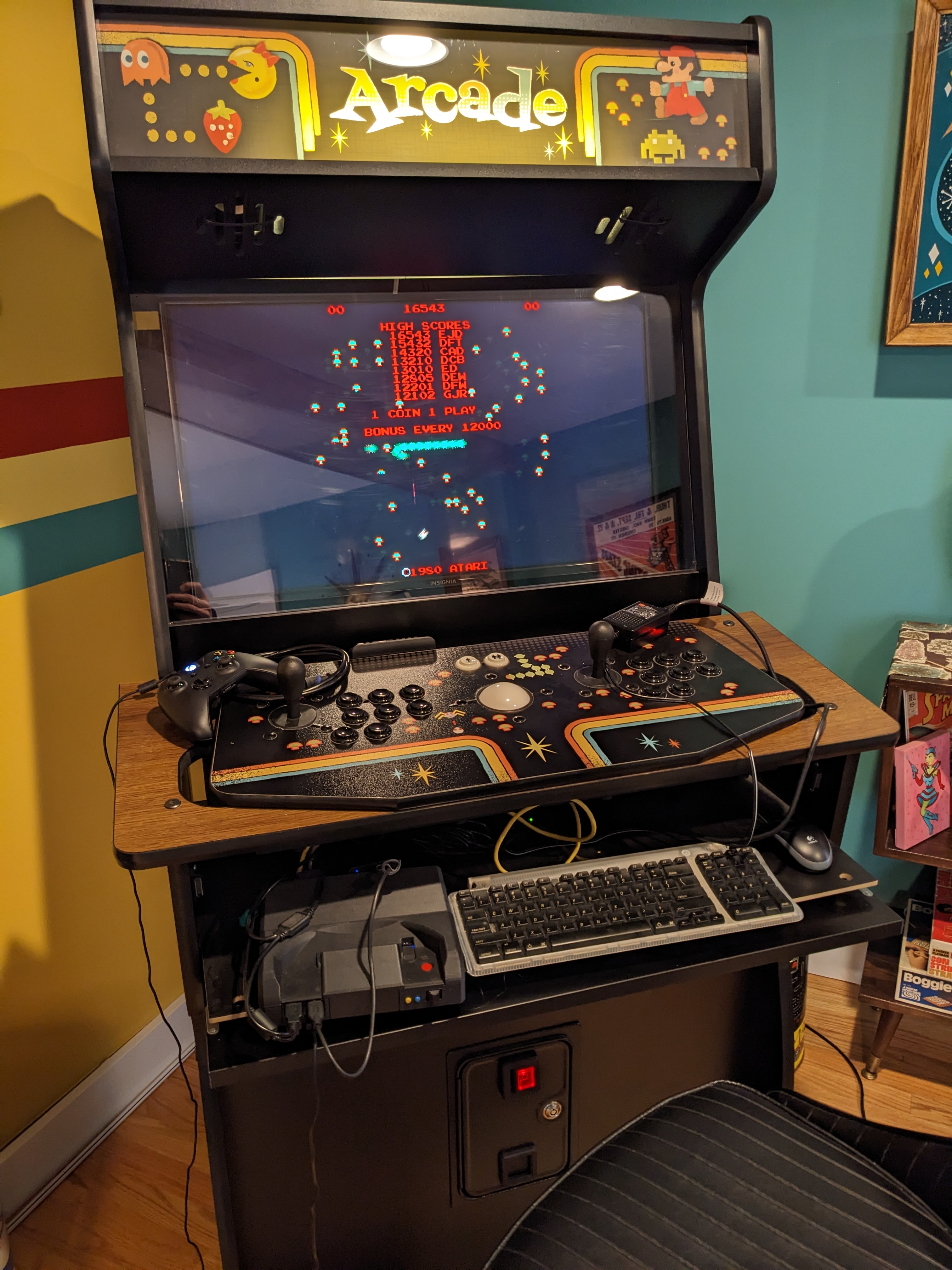I am not writing this as a "getting started" or beginners guide, though it might evolve to serve that for some people. It's just notes I'm taking for things I need to look up. I'm not going to do any in-depth technical review or anything, go watch a youtube video for that. My perspective is from a career as a sysadmin and Linux user. Your mileage will certainly vary.
I strongly encourage you to skip my un-edited drivel and just scroll to more listy looking part.
This past weekend we resolved to kicking off, tidying up and playing with the MiSTer Multsystem. The actual "Problem" with getting this project going was that everything was way too easy to get, which has been our luck every time we need any Raspberry Pi's and stuff. We anticipated about a 3-4 month minimum lead time to land all the parts, figure out how it all goes together and how to get software to it. Everything turned up within a week. We got the DE-10 direct from the Terasic and they shipped pretty much immediately. Same story with the MultiSystem pack. I've been extremely interested watching this project as Neil has announced updates and features. The box was well packed and safe even after a real kicking by the various shipping companies.
I think it sat on the Project shelf for a month before we even had time around the holidays to put it together and try it out. It was super easy to assemble. Note: I spent 3 or 4 years in a local computer store in the '90s, and a 25-mumble-year career in IT so your mileage may vary. Actually that's not fair. Natalie did pretty much all the assembly work with me just kind of putting the case together. I'm still paranoid that I over-tightened screws or something since I've never really worked much with 3d printed anything. The case is very nice, well laid out and, while tight, everything is easy to route and very well documented.
Goals vs Reality

The Plan: This guy should sit prominently in The Room, quite probably wood-grained and hooked up to the main TV. There it would host all the console games for all the consoles neither of us ever had, and so have no muscle memory or nostalgia for. You know, For Kids.
The Reality: I was familiar from well-afar of the Mister project for some time. I know why the ST is there, and given all our other projects, this does have the capacity of seriously amusing me. But I wasn't sure about the MiSTer's interface, it looked like it might be a lot less friendly than something like EmulationStation. And that's a thing I go into below.
The other day I temporarily yet elegantly installed the MiSTer in the arcade cabinet and gave it a quick smoke test to make sure it still did things. I took a few minutes to figure out what using the external drive that I just happened to have hanging around was about and the effect it had on the virtual filesystem browser stuff.

1 week later and we spent a couple of hours today playing a bit, loading more games and software, then playing a bit more. Natalie wanted to start getting things documented for the Manual to the Living Room we are slowly beginning to put together. As we went through computer platforms from Atari 8-bit, ST, Amiga Natalie was taking notes on how to load software on each and get back to the main menu and whatever but really aside from necessary differences in how the keyboards are mapped, everything's just the same. We've been playing with an X-Box 360 controller because it's the only controller we own and it just worked. The arcade controls are going to take a bit of effort but the sticks and the trackball work, I just need to map buttons, and from what I can see that's not very hard.
The Big, Ugly Truth
The reason I really liked the standard linux machine plus a slick launcher is because it looks nice on the arcade cabinet and people could navigate it pretty easy. You know what? There are no "people" and this thing is way more convenient to use than the Pi + RetroPie. No trying to keep the button layout relatively synced between a bunch of different MAME emulators. Make that "A bunch of different versions of a bunch of different emulators". Nothing was ever consistent beyond the necessary controls. But it does look cool.
Enter the MiSTer. Since we're not emulating, there's not really anything much to tweak. Everything can pretty much be set up globally aside from a few platform specific changes. Even with arcade cores the UI is so consistent and easy to deal with that I won't exactly be pining for RetroArch any time soon. I need to figure out how to set a default set of controls though so I don't have to set the controls up for every single arcade cabinet forever. I know there's a menu item for that I just haven't pulled the trigger on possibly screwing things up yet.
It's also extremely easy to keep updated with all the latest cores using the "update_all" script. I'm using the "RetroDriven" fork, though I'm not sure what materially differs from the main line version. It's just the one I saw first. That tool was a revelation since you can just have it go out and populate any missing arcade ROMs, as well as adding cores that haven't made it to the main-line MiSTer distribution yet.
Sound can be /amazingly/ better than MAME. I'm not familiar enough with any console game to know what it should sound like vs an emulator. But I played a couple of games to test out Donkey Kong and it took me 3 games to get past just how much better it sounded on exactly the same hardware. I think it's like emulating a Moog synth vs copying it electrically at the circuit level. It'll at least get you a lot closer to "actual hardware" than MAME possibly can. (Important Note: The 4th game of DK I got within 700 points of my personal best 62,500 score on the board, and it's not like I'm constantly playing that game, it's pretty rare for me to do that well that quickly. [I think it's really more like 85k but that was before we had the board so I can't remember])
Conclusions?
While it's true that there are some arcade games that aren't yet "there" on the MiSTer, which work fine on a Pi-3, the fact is that while a given arcade core might not be ready for showtime just yet, like OutRun. And obviously there are systems that are simply too complex for the DE10-nano to copy. There are options, and they're imperfect, but still fun. The Sega 32x core works just fine I guess for games like Virtua Racing, and the Saturn core seems to be coming along fast. However for me a lot of the real value of this system is going to come in running the computers of my youth. Since I always had computers, I never really had consoles aside from the 2600 so I've been playing with the Atari 8-bit and ST cores (and the Amiga, because, you know, let's be real...). I'm even going to set up some hard drive images and profiles for color vs high-res mono.
This will get us through in emulation until the Next Big Kickstarter shows up at my door and I can use the ST to all of its ability with my SpecreGCR cartridge, etc...
I think we're into the MiSTer Multisystem for somewhere in the region of $400-$450. That's kind of steep, however what you get is every game released for every console up to about the PS1 / Sega 32x and maybe Saturn-ish. Plus all the 8-bit and 16-bit computers of the '70s through the early '90s, and their entire libraries. Plus a couple hundred arcade games. All easily managed in a simple to use and easy to understand interface.
Definitely 100% worth a look, especially given what people will spend for those "throwback" mini-consoles with a fixed set of titles baked into some potted-blob SoC.
I'm going to move a lot of the above into sorted bullets. I'm throwing some stuff around and will organize it as I go.
The "Minimig" Amiga emulator seems to run /way/ too fast, and I can't see any setting to slow it down, all indications are that it should be running a 7.whatever Mhz 68000. But the ST one works great. I saw someone saying the music was too fast, but indicated the game play was accurate. I disagree, the whole thing feels too fast to use for games I have muscle memory for (Tower Toppler).
As noted above in detail, the sound is fantastic, it's not even close.
Video Weirdness. I'm positive this is down to some scaling setting. I'm trying to get screenshots but my Mac keyboard doesn't have either a printscreen key or an F13 key, so balls. To use DK as an example since it does show up prominently what I'm seeing is variable "width" of identical single-pixel vertical lines or dots. So for instance the ladders in DK. One side of the ladder might be narrower than the other. Usually I see "normal" and "skinny" ladders, but I think I saw a "fat" one or two. Similarly in Ms. PacMan, some dots render as skinny. Aspect ratios seem correct otherwise so that's why I'm thinking it's some setting somewhere maybe. I don't even care it's a trade-off I'm willing to make for all the other benefits for gameplay and manageability.
Yep, that was it: There are video processing options and you can choose from a list of profiles to match what you're doing
I do wish I could figure out how to directly edit core configs from the command line. Everything I've found seems to either be an empty file or binary that I can't modify. I'm sure there's something I can do. I'd love to figure out how to set generalized defaults for all cores, and then the user can define anything custom. So one key layout that will generally work across the board and then per-core settings can override that. Those per-core files could be shared as well. An editable "SNES Core - MS XBOX 360 Controller.cfg" or whatever.
I'm struggling to correctly make a folder for favorites using symlinks with absolute paths